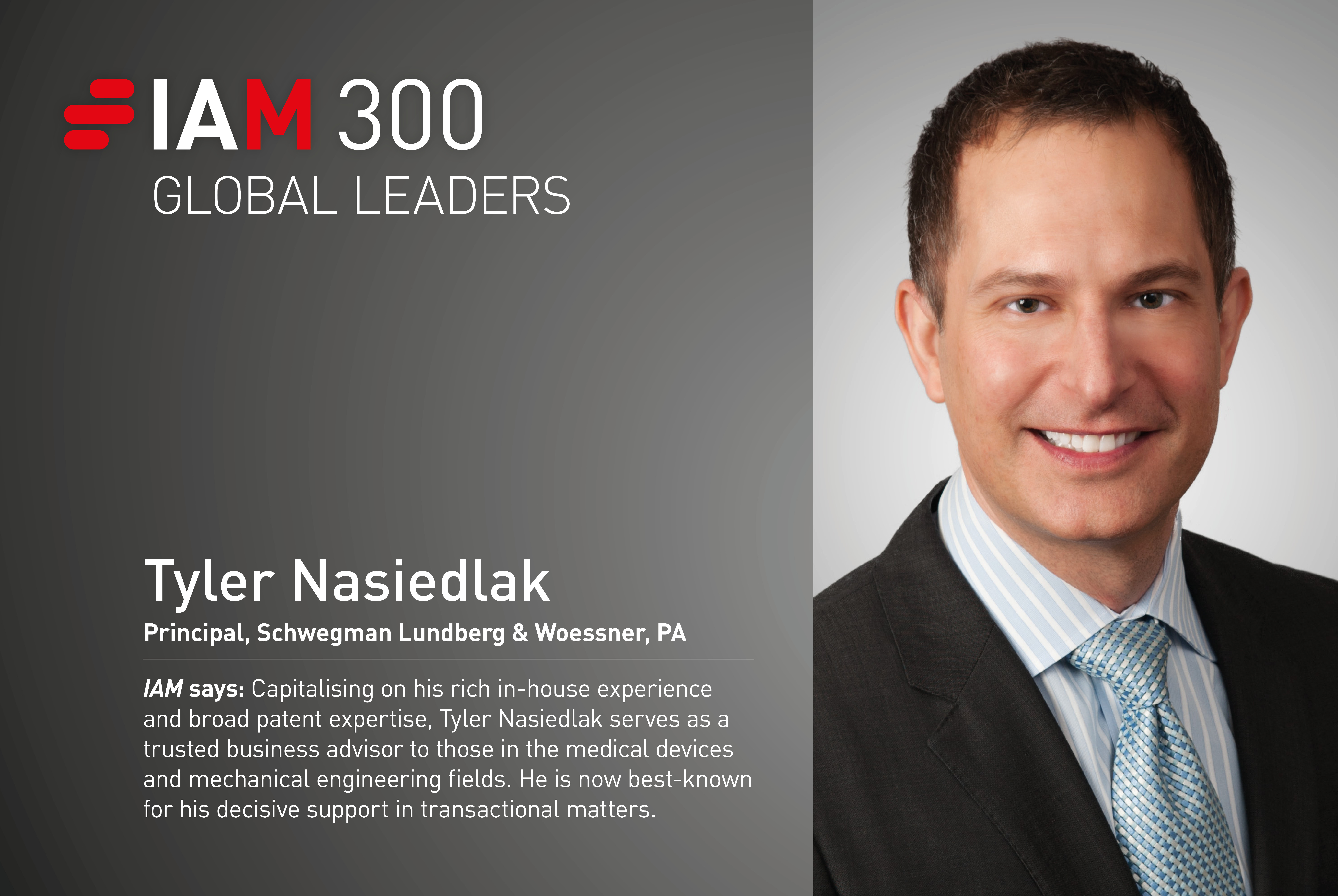Tyler Nasiedlak
As principal at Schwegman Lundberg & Woessner, what does inspiring leadership look like to you?
At Schwegman, we value giving our attorneys the autonomy to choose the types of clients and matters on which to work. While leadership comes in many forms, it is important that we provide room for our people to grow and develop their legal and client relationship skills. Empowering our attorneys and providing them with proper guardrails and guidance is critical for developing their ability to provide expert, high value legal advice. Great leaders must also be mindful of succession. At the end of the day, I am not fully doing my job if I am not developing attorneys that can step in and eventually represent our clients across all of their IP issues.
How has the IP transactions space evolved over the course of your career?
Data rights – whether Big Data, personal data or simply copyright – has become an emerging issue over the last several years. Negotiation over how these rights are owned, shared and licensed in IP transactional agreements has become much more common. Further, generative AI is becoming a growing concern. We have had clients go so far as to preclude their business partners from using generative AI in any work under their agreements. While everyone’s approach can differ, we endeavour to collaborate with our clients to understand their goals and to put the right contractual terms in place. Evolution of transactions occur on a client level and it has been quite rewarding to help them move from start-up agreements to NDAs, or from consulting and development agreements to licensingin and M&A agreements – whether making their own acquisitions or being acquired themselves.
What trends do you see emerging in FRAND licensing and how can companies best prepare themselves to take advantage of these? Throughout your career, you have gathered extensive experience in crafting patent enforcement strategies. In your view, what are the most vital characteristics that a skilled litigator must have?
Great communication skills and the ability to build rapport within a courtroom is crucial. On one hand, litigators must be able to effectively communicate with the client and upper management, simplifying complex litigation issues so that timely and effective business decisions can be made. Equally, they must be comfortable in the courtroom (whether district or appellate) in which they are litigating. Lots of cases are decided well before trial, so the best attorneys are also effective team leaders and strategic thinkers, able to put their clients in the best position on the papers filed pre-trial. At Schwegman, we do not manage litigation, but our clients routinely seek our advice and input on potential trial counsel. These are some of the important characteristics I consider when recommending litigation counsel.
If you could change three things about post-grant proceedings in the United States, what would they be, and do you think they are likely to happen?
My work in front of the PTAB on post-grant proceedings is client driven and represents only a part of my practice. I do not routinely practise before the PTAB, but I have managed numerous post-grant challenges there over the years. My views on potential changes to proceedings may be much more general than some of my colleagues who interact with the PTAB more frequently. I feel that the PTAB and the larger USPTO carry out exceptional work, especially given the complexity and size of their workload. To avoid weighing in on PTAB and post-grant policy too heavily, I would say that we should continue to increase their resources, whether that is by providing newer or more effective IT infrastructure, better software tools or by increasing their headcount. I would also consider simplifying post-grant proceedings, making them less litigation-like with depositions, and more streamlined like EU oppositions. As for the likelihood of this being implemented, I do not think it is unrealistic to say that the PTAB will get access to more IT tools in the near future. That being said, I do not think that post-grant proceedings in the United States will become more like EU oppositions, and I have little insight into whether their headcount will be changing.
Tyler Nasiedlak
Principal
[email protected]
Tyler Nasiedlak is a registered patent attorney and principal of Schwegman Lundberg & Woessner. His practice is focused on representing companies and investors on intellectual property and transactional matters. Namely, Mr Nasiedlak practises patent portfolio strategy and development, freedom-to-operate and patent landscaping studies, due diligence and counseling in connection with acquisitions and divestitures, patent validity and infringement opinions, licensing and other technology transactions, post-grant proceedings and patent enforcement and litigation strategies.
